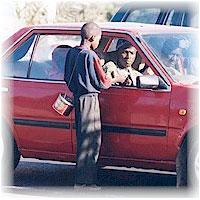BURKINA FASO: Fresh approach to street children

Friday, May 9, 2008
With
an increased number of children living in the streets of urban areas in
Burkina Faso, the government and several non-governmental organisations
are coming up with new approaches to address the problem.
“If we can help relieve parents’ poverty this will prevent children from turning to the streets in the first place,” Haridatou Congo, who leads the children’s national action plan at the ministry of social welfare, told IRIN.
In 2007 the government launched a US $9.8 million programme to help families whose children may be at risk of taking to the streets, by paying school fees, giving food, and creating community activities for children.
Congo said the government would also take “vigorous measures” to enforce
a 1996 law banning begging, though she did not lay out details of the measures.
Thousands of children, some as young as seven years old, come to the country’s cities from rural areas and end up living on the streets.
“So far progress in reuniting them with their families has been very slow, she said, “and the longer children stay on the streets the harder it gets to send them back home.”
Up to 40 percent of the street children come from Koranic schools where they have to beg for alms to help fund their education, Congo said.
An increasing number the street children are girls, said Joel Kargougou, a former street child who now runs a local NGO for orphaned children called AMPO.
“Girls are most vulnerable and some of them may be HIV positive or pregnant and so they are not accepted in their home villages.”
Many children end up on the streets when their parents migrate to find work or they are pushed by their families because of poverty.
The Burkina Faso Red Cross (BFRC) is trying to address the problem at its source by supporting 225 women in five provinces in rural areas with 50,000 loans to generate income so that they are better able to care for their children.
But Congo, of the ministry of welfare, said that even with the US$9.8 million of the programme for street children, it receives less than one percent of the government’s annual budget.
In late 2007 the government announced that NGOs working with street children would receive US$117,000 each year but the NGOs IRIN contacted said they have so far not received any money.
AMPO is using its limited funds to provide skills to street children with training to become tailors and gardeners.
“We do not have the means to follow up to see how all the children we train are doing,” Kargougou said. “For all we know they just end up back on the streets again,” he said.
“If we can help relieve parents’ poverty this will prevent children from turning to the streets in the first place,” Haridatou Congo, who leads the children’s national action plan at the ministry of social welfare, told IRIN.
In 2007 the government launched a US $9.8 million programme to help families whose children may be at risk of taking to the streets, by paying school fees, giving food, and creating community activities for children.
Congo said the government would also take “vigorous measures” to enforce
a 1996 law banning begging, though she did not lay out details of the measures.
Thousands of children, some as young as seven years old, come to the country’s cities from rural areas and end up living on the streets.
“So far progress in reuniting them with their families has been very slow, she said, “and the longer children stay on the streets the harder it gets to send them back home.”
Up to 40 percent of the street children come from Koranic schools where they have to beg for alms to help fund their education, Congo said.
An increasing number the street children are girls, said Joel Kargougou, a former street child who now runs a local NGO for orphaned children called AMPO.
“Girls are most vulnerable and some of them may be HIV positive or pregnant and so they are not accepted in their home villages.”
Many children end up on the streets when their parents migrate to find work or they are pushed by their families because of poverty.
The Burkina Faso Red Cross (BFRC) is trying to address the problem at its source by supporting 225 women in five provinces in rural areas with 50,000 loans to generate income so that they are better able to care for their children.
But Congo, of the ministry of welfare, said that even with the US$9.8 million of the programme for street children, it receives less than one percent of the government’s annual budget.
In late 2007 the government announced that NGOs working with street children would receive US$117,000 each year but the NGOs IRIN contacted said they have so far not received any money.
AMPO is using its limited funds to provide skills to street children with training to become tailors and gardeners.
“We do not have the means to follow up to see how all the children we train are doing,” Kargougou said. “For all we know they just end up back on the streets again,” he said.
Source: IRIN NEWS http://irinnews.org
 Back and Next - Back and Next
Back and Next - Back and Next See Also - See Also
See Also - See Also